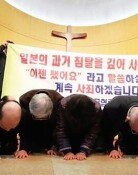Soaring Won calling for Emergency
Soaring Won calling for Emergency
Posted July. 21, 2003 21:59,
With the US and the EU continuously criticizing that ²China, Japan, Korea, Taiwan and other Asian countries are artificially depreciating their countries` exchange rate, leading the trade balance to an enormous surplus,² concerns over a possible exchange rate war between Asian countries versus the US and the EU are surfacing.
As for Korea, the value of won to the dollar has increased greatly for the last 18 months, and the won value is expected to rise further boosted by exchange speculation. Higher won would mean weakening export competitiveness for Korea.
Meanwhile, China and Taiwan, Korea`s trade competitors, have fixed their exchange rates against the dollar.
On July 21, the Bank of Korea and the Korea Center for International Finance announced that while won to the dollar climbed up 9.0% since January 2002 until June 2003, Chinese Yuan fell by 0.01% and Taiwanese dollar went up by only 0.7%. The Euro rose by 25.3% during the same period, and Japanese Yen also saw an 11% increase.
With the rise of the won value, won-dollar exchange rate fell from average 1251.24 won of last year to 1193.45 won by mid-June, and is maintaining at 1170 ~ 1180 won level in July.
US Senators of both Democratic and Republican Party have urged the Treasury Department on July 17, to investigate on whether China is deliberately undervaluing the Yuan in order to lower the prices of export goods.
The Chinese government repelled the investigation, saying that they are ²currently unable to find any reasons to make changes in the Yuan,² and that they ²will adhere to the current exchange rate.²
According to the authorities, as Japan, Taiwan and Hong Kong are recently showing defensive movements toward the exchange rate through oral interventions and interest rate cuts, it is inevitable for Korea to enforce exchange rate policies in order to protect Korean export industry from damages.
Accordingly, the BOK and the governmental departments have agreed to get approval from the National Assembly for supplementary issuance of 4 trillion won, to replenish the foreign exchange stabilization bond issuance limit, of which only 800 billion won remains.
However, foreign exchange experts are pointing out the fact that the government`s market intervention is not sufficient to stop the upward tendency of the won value, and are urging for a comprehensive measure to stably maintain the won value for a longer period.
Kwu-Jin Lim mhjh22@donga.com







